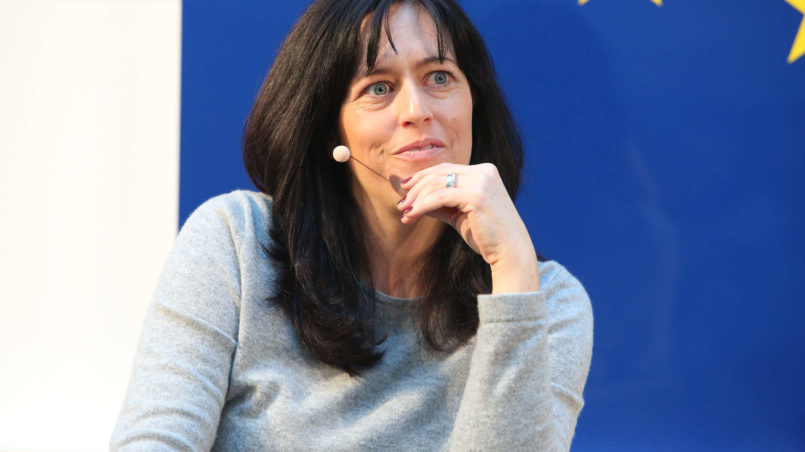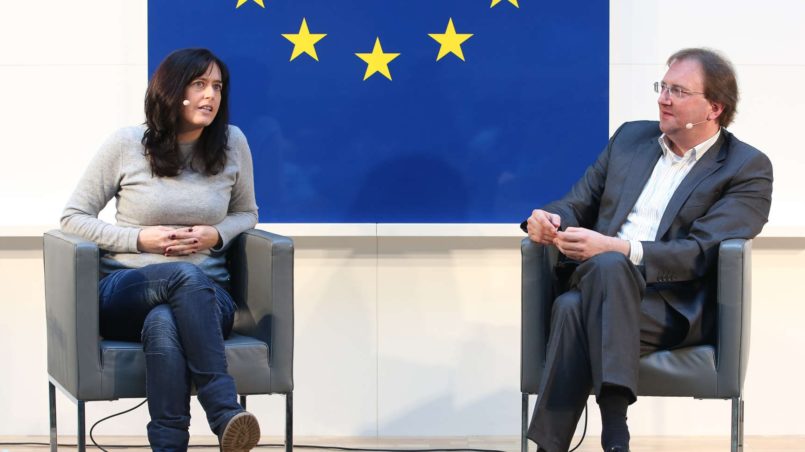Europa DIALOG with ORF London Correspondent, Bettina Prendergast

Event data
- Datum
- 6. 12. 2016
- Host
- Europa:DIALOG
- Location
- Haus der Europäischen Union, Wipplingerstraße 35, 1010 Wien
- Event-type
- Dialog
- Participants
- Bettina Prendergast, ORF-Korrespondentin in London
- Benedikt Weingartner, Moderator
On the occasion of the Europa DIALOG series in the Haus der Europäischen Union, Vienna on 6th December 2016, the ORF London correspondent, Bettina Prendergast, was questioned about the current situation in Great Britain, with a focus on Brexit and its consequences.
Moderator: Benedikt Weingartner
Summarised, Bettina Prendergast’s personal opinion on Europe:
For me, Europe is the most successful peace project of all time, whose continued existence is in acute danger if Brussels does not take the worries of all EU citizens seriously and if political opportunism prevents necessary reforms.
DIALOG
What is your personal relation to Europe?
In the last decade, Europe has changed greatly and has changed to the detriment of Great Britain. The European Union cannot be given all the blame, but Prendergast understands the frustration of the people there: for example, there were no access periods when the unbridled immigration, above all from eastern European states, took place.
The reproach can actually be directed to Tony Blair, who appeared arrogant and said: “Our economy is strong, it is growing so fast, the eastern Europeans can come – we can manage the situation.”
The government provided workplaces but not, however, anything more. The British, by the way, cannot be considered as racist – ultimately it is a nation which consists of immigrants and a plurality of nations – rather it has developed a feeling that the island has already become “too full”. The immigration from non-EU foreigners – the percentage of their immigration is much higher or at least equally high there – has to be put to an end.
The health system in Great Britain is free for everyone (they only have to pay a small excess for the dentist); however, considering the increasing life expectancy and the mass immigration, these factors pose a problem for the system, the more so due to the lack of trained specialists.
On the other hand, she criticises the desire of the British, post-Brexit, as she would have found it more advantageous if the British had exerted their power and influence within the EU. It could have exerted more pressure in order to be able to reform the EU from within. The London corresponsdent considers the reform of the EU and its proximity to citizens important.
But the citizens could not come to terms with Brussels at all and only saw there “arrogant bureaucrats who earn much money and who do not understand the worries of the people.” According to the latest survey, all those who voted for Brexit would definitely do so again today.
The EU supporters simply neglected to highlight the positive aspects and the numerous support programmes of the EU and ignored immigration as a problem.
How did it come to the Breit vote and what is the status quo?
The EU referendum of David Cameron was a political move but the result completely backfired. The Conservative Party in Great Britain – and this can be proved historically – has aways had a problem with Europe. And in Cameron’s party there were always members who were EU sceptics. Cameron wanted to resolve the EU issue with the EU referendum.
At the same time Cameron wanted to finally force the UKIP, which, in the national and EU elections, had “stolen” votes, into a corner. But he had not counted on winning the 2015 election with an absolute majority and that is why he had to hold the EU referendum. With this tactic, it ultimately came to the EU referendum.
This is actually a mishap of global history. It is a referendum that should never have taken place and whose result should never have been reached.
The outcome shocked and surprised the whole of Europe and actually nobody expected it …
Everyone – opinion pollsters, politicians, experts – despite the EU scepticism in this country prior to the campaign, had merely expected a close “Yes” vote for Europe.
The only ones who were not astonished were the people on the street; in the rural areas, in the north, also in the county of Essex where I live with my family, the people shrugged their shoulders and said, “Ok, it is as it is. We have given you a kick in the backside and now see to it that you get us out of the EU and that our country does better at last!”
It was clear that Cameron could not survive politically and that he had to resign.
Now Theresa May is the new Prime Minister – a very strong voice which speaks clearly for Brexit…
She has to do this now and she also has cleverly kept out of everything. As a strong and authoritarian individual, however, she does not like to be compared to Margaret Thatcher; she accepted the position with the aim of getting Great Britain out of the EU and negotiating the best deal for the country. She respects the will of the people towards Brexit.
Prendergast asks herself how she wants to do this: Theresa May has always been a person who does not like to show her cards She is very quiet, she has a very tight circle of advisors, she is very conscientious, she is considered as somewhat of a control freak…
As soon as Article 50, the EU withdrawal request, is submitted in Brussels at the end of March 2017, we will know more.
With the decisions of the High Court and Supreme Court there is still hope that a spoke could be put in the wheel …
There are enough scenarios: before the Supreme Court, the judicial dispute centred on who is allowed to submit this withdrawal request in Brussels – whether the government can do so alone or whether parliament has to be asked (Great Britain is a parliamentary democracy, the sovereign is the parliament).
Now the government is saying: “We passed a law in order to be able to hold the EU referendum.” In this EU referendum law it is, however, clear that if Great Britain voted for Brexit, a logical consequence would be that Article 50 would be trigggered – a parliamentary consultation should actually not be needed at all.
However, the complaining party – the activist, Gina Miller, “a businesswoman and a hairdresser”- should have joined forces and contested this. According to Prendergast, as a result, there is now a possibility that everything is delayed and that a new law will be passed.
This Brexit vote was a democratic decision and should actually therefore be respected …
The claimants who submitted this would only have had to appeal to applicable law but that would create a very bad atmosphere: the claimants have already received death threats. Rhetoric and aggression on the part of certain people lead to an escalating situation.
In 1963 and 1967 applications were submitted for EU accession but Charles de Gaulle prevented this with a veto and considered Great Britain as “incompatible with Europe”; after his resignation in 1973, the accession followed …
The heart of the older generation – considered from a demographic perspective – does not really support Europe. On the other hand, the young people are very disappointed with Breit. The Brexit opponents in particular are better educated people and people in safe jobs who move on the international level and who have a lot to do with Europe.
How does Great Britain feel about the other European countries?
As an EU foreigner, I have the feeling that you are accepted in Great Britain as a “foreigner”; the British do not have a problem with this. In Great Britain there are, however, only 25,000 Austrians – we are not so noticeable. But there are 800,000 Poles and 600,000 Romanians and they partially change the view of a place …
The state did not make provision for this and this is felt, above all by the EU foreigners; incidentally, a differentiation is made between first-class and second-class foreigners. Studies have shown that EU foreigners make a high contribution, pay taxes and are not such a burden on the social system – the perception of the people, though, is different and it is difficult to change this.
Great Britain is very tolerant, accepts much but the problem in reality lies in the “parallel societies” which have formed – and thereby the concomitant lack of integration. Among the non-EU foreigners there are great problems:
For example, in the Pakistani communities, men would very often arrange for wives to be brought from Pakistan; these women did not work, they did not maintain any social contacts and did not speak English. And for fear of being called racist, therefore as a result of a false comprehension of tolerance, one now excuses the “cultural differences”. As such, it is generally accepted that women are oppressed in the family.
In contrast, the eastern Europeans – the EU foreigners – have become well integrated but the British people are, despite this, overburdened with the sheer numbers, for example of the Poles.
Has Great Britain remained immune from the refugee issue?
The official government line states that Great Britain has invested more money in the refugee question than other EU countries – but Prendergast emphasises that Great Britain, as a very rich country, could do more.
You mention “rich country” – but the Brexit vote will probably be very expensive for Great Britain…
That depends on the court proceedings which are still outstanding – the exact figures are not yet known.
Are people not afraid that the economy will collapse and that international companies will leave the country?
Prendergast present the British as a very self-confident people:
The companies which have a connection to Europe and which were against Brennt naturally say with a heavy heart: “Oh I am curious to see what we will have to face, what tariffs and duties we will have to pay.” The Brexit supporters say: “Why? We are doing just fine! This year we have grown considerably stronger than the EU: in economic terms, we are among the G7, therefore, as regards economic growth, the strongest country.”
Apart from the crashing pound, there have been no horror scenarios and Great Britain, with a record high employment figure, is not in a recession as predicted by the former Chancellor of the Exchequer, Osbourne. But the consequences of Brexit will still be felt, according to Prendergast.
The government is taking precautionary measures by obligingly sinking the taxation of companies and it is being said that the Prime Minister intends to halve taxation by 2020 …
Prendergast consider sthe reducing of corporate tax to up to 15-17% as “crazy”; Great Britain needs this tax revenue, above all, post-Brexit. Further, the EU would not be particularly happy about this. The Prime Minister envisaged this on one occasion but this plan is not yet definite.
How have young people in the United Kingdom reacted to Brexit?
Prendergast attested to the “deep depression” among young people:
Students with strong relationships to Europe are badly hit and they are asking themselves how things can continue; what is going to happen with the grants, science, agriculture? I do not believe that these grants will be replaceable.
The British government has not yet announced further plans concerning this. For months the government has merely been saying: “We want the best deal possible.” But nobody is saying what this plan should be.
Labour policy in the United Kingdom is know as very liberalised: it is astonishing that 20% of the working population have a “zero hours contract”. What are these?
Some people value flexibility at the workplace. If I, for example, work as a waiter, I only get paid for those hours that I work; the hours however, are not guaranteed. Today, for example, it is ten hours, next week none, the week after next five hours, etc. As such, the employer has no risk because, when he needs someone, he has someone; and if he needs nobody, he incurs no costs.
The socialist Labour party of course rejects this labour policy and wants to abolish it. Because this is then the “working poor” who, although in full employment, cannot actually make ends meet.
Question from the audience: Are the arrogance of the European Commission and its representatives, the over-regulation of laws and the excessive bureaucracy not to blame for this development?
Let me give you an example: I was in a salmon factory in London. The boss there said to me: “Look, I have had to re-print all my labels because of a new EU regulation. And now I have to print on the salmon: Careful, contains fish!”
Prendergast criticises all the “nonsense” that comes out of the Union but stresses that also much that is meaningful is decided in Brussels. However, only the nonsense is made public.
Great Britain is a military power through NATO, even a nuclear power – are there any discussions that Europe could need still Great Britain in security issues?
Prendergast is certain of this: the British strongly believe that Europe will continue to need the excellent secret services and the cooperation of the police in security questions, in which very close cooperation with Europe is desired. In return Great Britain hopes for milder treatment from Brussels and that everything at the moment is unclear .
In conclusion a very personal question: you have been living in Great Britain for ten years, your children are growing up there – how would you like Europe to develop, with or without the United Kingdom?
I wish for a Europe which is closer to its citizens; the people should know what Brussels stands for. I feel that the emotional difference between “those at the top” and “those at the bottom” will grow greater. I think that it is very important that the people come together again as otherwise there is threat of a further wave of right-wing populism. Europe should stay together, grow together but also change from within and become something which the people consider worthwhile.
The crisis is a possibility – and one can only hope that this opportunity will be seized.



